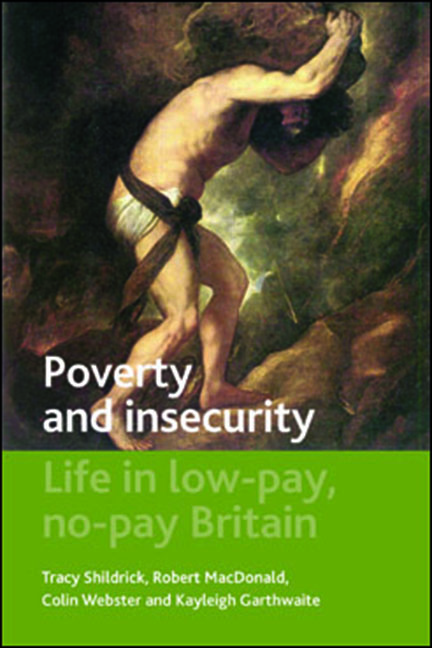Book contents
- Frontmatter
- Contents
- List of figures and boxes
- Acknowledgements
- 1 Introduction
- 2 Poor work, welfare and poverty
- 3 Researching the low-pay, no-pay cycle and recurrent poverty
- 4 The low-pay, no-pay cycle: the perspectives and practices of employers and ‘welfare to work’ agencies
- 5 The low-pay, no-pay cycle: its pattern and people's commitment to work
- 6 Searching for jobs: qualifications, support for the workless and the good and bad of informal social networks
- 7 Poor work: insecurity and churning in deindustrialised labour markets
- 8 ‘The ties that bind’: ill health and caring and their impact on the low-pay, no-pay cycle
- 9 Poverty and social insecurity
- 10 Conclusions
- References
- Index
8 - ‘The ties that bind’: ill health and caring and their impact on the low-pay, no-pay cycle
Published online by Cambridge University Press: 07 September 2022
- Frontmatter
- Contents
- List of figures and boxes
- Acknowledgements
- 1 Introduction
- 2 Poor work, welfare and poverty
- 3 Researching the low-pay, no-pay cycle and recurrent poverty
- 4 The low-pay, no-pay cycle: the perspectives and practices of employers and ‘welfare to work’ agencies
- 5 The low-pay, no-pay cycle: its pattern and people's commitment to work
- 6 Searching for jobs: qualifications, support for the workless and the good and bad of informal social networks
- 7 Poor work: insecurity and churning in deindustrialised labour markets
- 8 ‘The ties that bind’: ill health and caring and their impact on the low-pay, no-pay cycle
- 9 Poverty and social insecurity
- 10 Conclusions
- References
- Index
Summary
Introduction
As stressed at the end of Chapter 7, the prime driver of the low-pay, no-pay cycle was the insecurity of employment on offer coupled with a strong motivation to work and to avoid being ‘welfare dependent’. In other words, the ‘demand side’ of the local economy – the spread and type of jobs that were available – was unable to properly accommodate people's need and appetite for jobs. Yet this was not the complete story that was told to us in interviews. ‘Supply-side factors’ also served to shape the low-pay, no-pay cycle. By this we mean that, in some situations and at some times, the circumstances and conditions of people's lives meant that they were unable to fully engage with employment, despite their enduring motivation to do so. In this chapter we focus on those issues that were most prominent in interviews in this respect: ill health that affected individuals or their families and the caring responsibilities that people had for others. As we will see, these were often closely related.
We will also argue, however, that it is difficult to separate out ‘demand-side’ and ‘supply-side’ factors in any simple way. Biographically focused interviews that explored individuals’ lives holistically and over the long term revealed the complexity of the relationships, for instance, between ill health, unemployment, poor work and an experience of extended precariousness and insecurity. At the simplest level, ill health could limit labour market engagement: people were not well enough to work. Engagement with the labour market, however, could also generate ill health which served to then limit people's availability for jobs: poor work made people ill. Being unemployed, however, also had negative health effects: unemployment also made people ill! The first part of the chapter describes and illustrates these relationships, in an attempt to unravel this complexity.
The second part of the chapter focuses on how caring commitments interacted with the low-pay, no-pay cycle. The availability of suitable childcare was a problem for many interviewees in their efforts to establish themselves in employment. Caring responsibilities were wider than this, however, and were often tied to problems of family ill health.
Information
- Type
- Chapter
- Information
- Poverty and InsecurityLife in Low-Pay, No-Pay Britain, pp. 143 - 166Publisher: Bristol University PressPrint publication year: 2012
